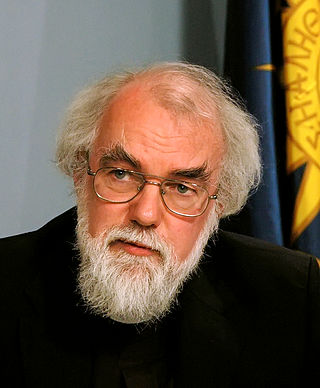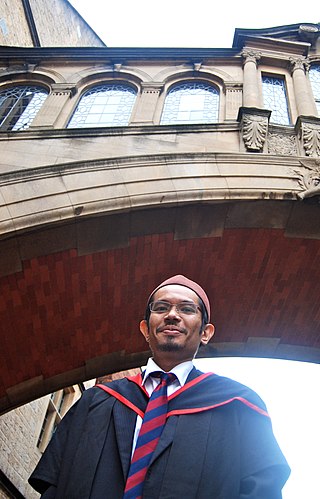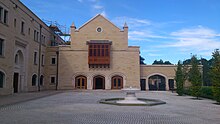
The Organisation of Islamic Cooperation, formerly the Organisation of the Islamic Conference, is an intergovernmental organization founded in 1969. It consists of 57 member states, 48 of which are Muslim-majority. The organisation claims to be "the collective voice of the Muslim world" and works to "safeguard and protect the interests of the Muslim world in the spirit of promoting international peace and harmony".

Rowan Douglas Williams, Baron Williams of Oystermouth is a Welsh Anglican bishop, theologian and poet, who served as the 104th Archbishop of Canterbury from 2002 to 2012. Previously the Bishop of Monmouth and Archbishop of Wales, Williams was the first Archbishop of Canterbury in modern times not to be appointed from within the Church of England.

Hamza Yusuf is an American Islamic neo-traditionalist, Islamic scholar, and co-founder of Zaytuna College. He is a proponent of classical learning in Islam and has promoted Islamic sciences and classical teaching methodologies throughout the world.

The Al-Azhar University is a public university in Cairo, Egypt. Associated with Al-Azhar Al-Sharif in Islamic Cairo, it is Egypt's oldest degree-granting university and is known as one of the most prestigious universities for Islamic learning. In addition to higher education, Al-Azhar oversees a national network of schools with approximately two million students. As of 1996, over 4,000 teaching institutes in Egypt were affiliated with the university.

The Quba Mosque is a mosque located in Medina, in the Hejaz region of Saudi Arabia, first built in the lifetime of the Islamic prophet Muhammad in the 7th century C.E. It is thought to be the first mosque in the world, established on the first day of Muhammad's emigration to Medina. Its first stone is said to have been laid by the prophet, and the structure completed by his companions. The mosque was subsequently modified across the centuries until the 1980s, when it was completely replaced by a new building that stands today.

Tariq Ramadan is a Swiss Muslim academic, philosopher, and writer. He was a professor of contemporary Islamic studies at St Antony's College, Oxford and the Faculty of Theology and Religion, University of Oxford, He is a senior research fellow at Doshisha University in Japan, and is also a visiting professor at the Université Mundiapolis in Morocco. He was a visiting professor at the Faculty of Islamic Studies at Hamad Bin Khalifa University in Qatar, and used to be the director of the Research Centre of Islamic Legislation and Ethics (CILE), based in Doha. He is a member of the UK Foreign Office Advisory Group on Freedom of Religion or Belief. He was listed by Time magazine in 2000 as one of the seven religious innovators of the 21st century and in 2004 as one of the 100 most influential people in the world and was voted by Foreign Policy readers as one of the top 100 most influential thinkers in the world and Global Thinkers. Ramadan describes himself as a "Salafi reformist".

Prince Hassan bin Talal is a member of the Jordanian royal family who was previously Crown Prince from 1965 to 1999, being removed just three weeks before King Hussein's death. He is now 20th in line to succeed his nephew King Abdullah II.

John Louis Esposito is an American academic, professor of Middle Eastern and religious studies, and scholar of Islamic studies, who serves as Professor of Religion, International Affairs, and Islamic Studies at Georgetown University in Washington, D.C. He is also the founding director of the Prince Alwaleed Center for Muslim–Christian Understanding at Georgetown.

Timothy John Winter, also known as Abdal Hakim Murad, is an English academic, theologian and Islamic scholar who is a proponent of Islamic neo-traditionalism. His work includes publications on Islamic theology, modernity, and Anglo-Muslim relations, and he has translated several Islamic texts.
The Oxford Centre for Hindu Studies, founded in 1997 and based in Oxford, England, is a research academy focused on the study and teaching of Hindu cultures of India and Nepal. It develops academic programmes of education, research and publishing in Hindu studies. It aims to encourage the Hindu community in the academic study of their own traditions and cultures. From 2006 to 2020, it was granted the status of a "recognised independent centre" working with the University of Oxford.
Farhan Nizami CBE is a historian of South Asia.
Abdel-Wahed El-Wakil is an Egyptian architect who designed over 15 mosques in Saudi Arabia and is considered by many as the foremost contemporary authority in Islamic architecture. For designing in traditional styles, he is also a representative of New Classical Architecture.
Randa Abdel-Fattah is an Australian writer of fiction and non-fiction. She is an advocate for Palestinian people and human rights in general, and much of her work focuses on identity and what it means to be Muslim in Australia. Her debut novel, Does My Head Look Big in This?, was published in 2005, and Coming of Age in the War on Terror was published in 2021.

Joel Hayward is a New Zealand-born British scholar, academic and writer. He has been listed in the 2023, 2024 and 2025 editions of The World's 500 Most Influential Muslims. He has been the Dean of the Royal Air Force College Cranwell and is now the Chief Executive of the Cambridge Muslim College in the United Kingdom.

Prince Ghazi bin Muhammad is a Jordanian prince and a professor of philosophy. He is the son of Prince Muhammad bin Talal of Jordan and his first wife, Princess Firyal. He is a grandson of King Talal of Jordan and thus a first cousin of King Abdullah II and sixteenth in the line of succession to the Jordanian throne. He is well known for his religious initiatives, about which a book was published in 2013.

Muhammad Afifi al-Akiti, also known as Shaykh Afifi, is the KFAS Fellow in Islamic Studies at the Oxford Centre for Islamic Studies. He is also the Islamic Centre Lecturer in Islamic Studies at the Faculty of Theology, University of Oxford, and is a Fellow of Worcester College, Oxford. He is the first Malay to be appointed to such a position in this university. Elsewhere, he is a visiting professor of Universiti Teknologi MARA in Malaysia. He has also received widespread media recognition across the globe.
The Halawa House or Agamy Beach House is a house located in Agami, Egypt that incorporates traditional Islamic and Egyptian prototypes. The project was completed in 1975 by Abdel-Wahed El-Wakil and was among the first recipients of the Aga Khan Award for Architecture in 1980. It is named after the project's client, Esmat Ahmed Halawa. The project was conceived as a method to bridge traditional forms and indigenous elements into a functional design for modern living.
The Duke Islamic Studies Center, also known as DISC, is an inter-departmental, cross-cultural center at Duke University dedicated to the study of Islam and Muslims. DISC describes itself as taking "a comparative, cross cultural approach to Islamic studies to encourage creative solutions to the economic, political and social challenges involving Muslims."

Ashok Swain is an Indian-born Swedish academic and public intellectual. He is a professor of peace and conflict research at the Department of Peace and Conflict Research at Uppsala University in Uppsala, Sweden. In 2017, he was appointed as the UNESCO Chair on International Water Cooperation and became the first UNESCO Chair of Uppsala University.
Charis Waddy was an Australian-born British author, lecturer and Islamic scholar. She worked full-time with the Oxford Group from 1935 after which it became Moral Re-Armament. Waddy wrote her first book, Baalbek Caravans, in 1967 on her experiences of staying long-term in Lebanon. She wrote The Muslim Mind in 1976 and authored Women in Muslim History four years later. Waddy received the Pakistani Sitara-i-Imtiaz in 1990 and was highly regarded worldwide by Muslims.















